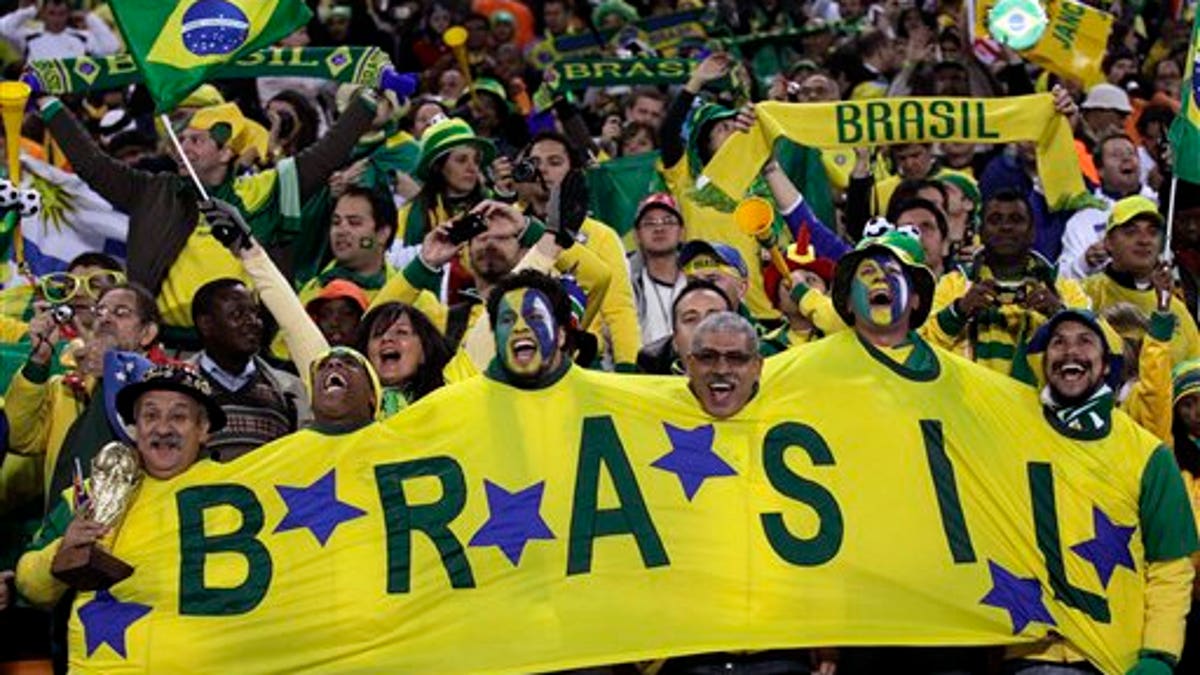
Brazil fans cheers prior to the World Cup group G soccer match between Brazil and Ivory Coast at Soccer City in Johannesburg, South Africa, Sunday, June 20, 2010. (AP Photo/Frank Augstein) (AP)
The recent announcement that a private company will take over revamping several of Brazil's international airports is another reminder that the country is struggling to keep up with the rigors of hosting two of the world’s biggest sporting events.
Brazil will host the 2014 World Cup but has failed to keep up with the deadlines and demands set by FIFA. It will also host the Olympics in 2016.
Air travel in and outside Brazil –thousands are expected to descend in Brazil for the world’s largest soccer tournament– has put many of the country’s airports under pressure. On Wednesday, it was announced that international airports in Rio de Janeiro and Belo Horizonte, two of Brazil's biggest cities, will be handed over to private operators to make sure they are ready in time for next year’s event.
And of the 12 stadiums that will host matches, nine will be built from the bottom up and three will be modernized. None of the arenas are currently ready.
Twelve cities will host at least four matches each.
To top it all off, Sao Paulo is in the grips of an intense crime war that saw close to 500 officers resign in protest after 500 murders were logged in the last quarter of 2012.
FIFA has repeatedly voiced its concern, at one point even causing an international incident of sorts when FIFA Secretary General Jerome Valcke said that Brazil needed a "kick up the backside."
Brazil Sports Minister Aldo Rebelo asked for Valcke to be removed from his post following his comments, and the country refused to work with him.
The situation in Brazil isn’t uncommon in regards to the World Cup or Olympic hosts.
“It’s not the first time that there have been delays and concerns and it won’t be the last time,” said Phil Schoen, an announcer for beIN Sport USA. “I’d be surprised if the [World Cup] was not a success in Brazil.”
Schoen, who has announced soccer for ESPN & Fox Soccer, including three World Cups, brought up 2010’s World Cup situation in South Africa, which also had problems meeting deadlines.
“There were similar concerns in South Africa where there were delays but they were able to get things done in time,” Schoen said. “The real concerns are going to be more in regards to transportation and infrastructure, you’re not going to always get a World Cup like in the United States or Germany.”
Another example of cutting it close is when Athens, Greece, hosted the 2004 Summer Olympics after years of struggling to meet deadlines set by the Olympic governing body.
Greek construction crews worked overtime to finish arenas and facilities in the final weeks leading up to the opening ceremony.
“Sometimes reality strikes,” said Schoen. “Though there might be some hiccups, overall they’ll get it done.”
Follow us on twitter.com/foxnewslatino
Like us at facebook.com/foxnewslatino
